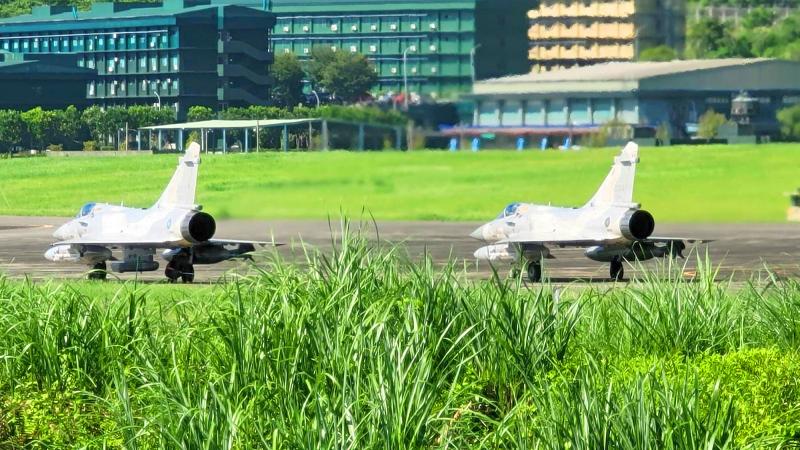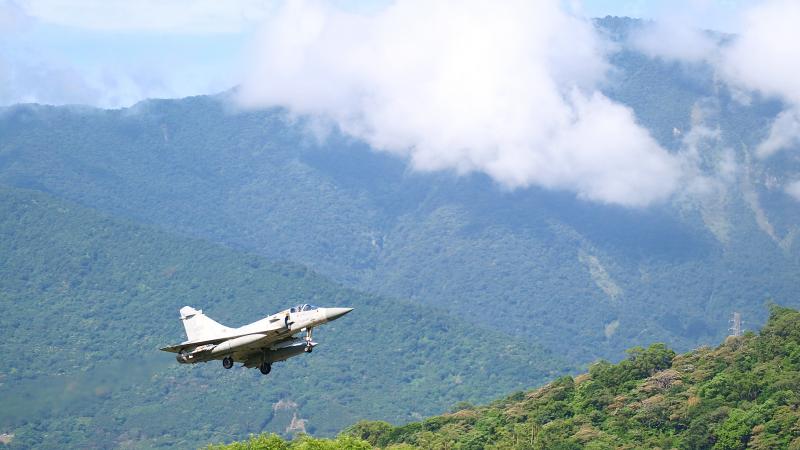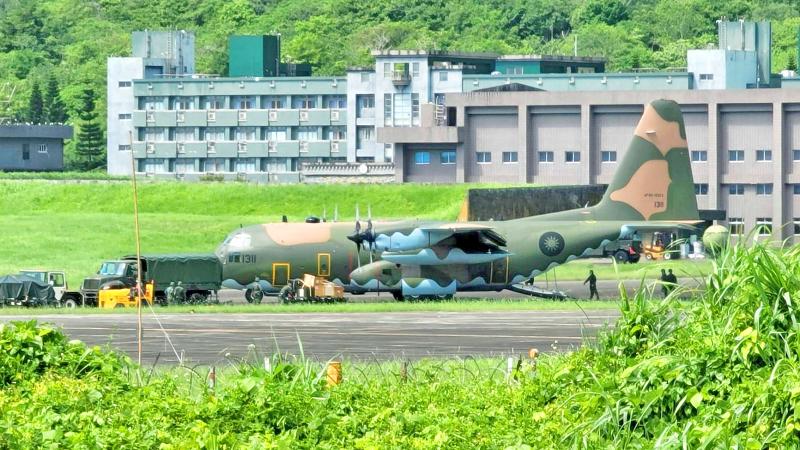The live-fire component of this year’s annual Han Kuang military exercises, Taiwan’s major war games involving all military branches, began yesterday morning and is to run until Friday to test the armed forces’ capability to fend off a Chinese invasion.
The 37th edition of the annual event officially began after the Ministry of National Defense’s Joint Operations Command Center, also known as the Hengshan Command Center, announced the initiation of the five-day live-fire drills.
Yesterday’s drills were focused on testing the military’s preservation and maintenance of combat capabilities in the event of a full-scale Chinese invasion.

Photo: CNA
As part of the drills, air force fighter jets that were originally deployed in the western part of Taiwan were dispatched to Hualien Air Base in the east in a simulation of an invasion, a military source said.
Military C-130 transport aircraft also sent military personnel responsible for fighter jet maintenance, together with related equipment and supplies, to designated locations in eastern Taiwan early in the day, the source said.
Another source said that the aircraft included F-16Vs and Mirage 2000s, while Indigenous Defense Fighter jets were dispatched to air bases in western Taiwan.

Photo: CNA
Meanwhile, all of the nation’s major naval vessels left their home ports and sailed to designated locations off the coast in preparation for confronting enemy forces.
The ships’ early departure is a preventive measure in anticipation of enemy bombardment of Taiwan’s ports, a military source said.
A biological agent containment exercise was also held in southern Tainan, in response to a mock assault where troops were assumed to be attacked by bioweapons.

Photo: CNA
Soldiers were promptly sent to nearby hospitals for simulated treatment by civilian doctors.
The military also rehearsed its procedures for the decontamination of vehicles and equipment during the drill.
President Tsai Ing-wen (蔡英文) yesterday wrote on Facebook that the exercises constituted a solid foundation for the nation’s security.
This year’s exercises in particular are aimed at showing the world the armed forces’ resolve in protecting the nation, she wrote.
The Han Kuang exercises have been held annually since 1984 in the form of live-fire drills and computerized war games.
This year’s tabletop drills were held from April 23 to 30.
The live-fire exercises were originally scheduled to start on July 12 and run for five days.
However, due to a domestic outbreak of COVID-19, the military postponed the live-fire component of the drill and rescheduled it for this week.
The scope of the drills has also been scaled down to contain any possible spread of the virus.

A magnitude 5.6 earthquake struck off the coast of Yilan County at 12:37pm today, with clear shaking felt across much of northern Taiwan. There were no immediate reports of damage. The epicenter of the quake was 16.9km east-southeast of Yilan County Hall offshore at a depth of 66.8km, Central Weather Administration (CWA) data showed. The maximum intensity registered at a 4 in Yilan County’s Nanao Township (南澳) on Taiwan’s seven-tier scale. Other parts of Yilan, as well as certain areas of Hualien County, Taipei, New Taipei City, Taoyuan, Hsinchu County, Taichung and Miaoli County, recorded intensities of 3. Residents of Yilan County and Taipei received

Taiwan has secured another breakthrough in fruit exports, with jujubes, dragon fruit and lychees approved for shipment to the EU, the Ministry of Agriculture said yesterday. The Animal and Plant Health Inspection Agency on Thursday received formal notification of the approval from the EU, the ministry said, adding that the decision was expected to expand Taiwanese fruit producers’ access to high-end European markets. Taiwan exported 126 tonnes of lychees last year, valued at US$1.48 million, with Japan accounting for 102 tonnes. Other export destinations included New Zealand, Hong Kong, the US and Australia, ministry data showed. Jujube exports totaled 103 tonnes, valued at

BIG SPENDERS: Foreign investors bought the most Taiwan equities since 2005, signaling confidence that an AI boom would continue to benefit chipmakers Taiwan Semiconductor Manufacturing Co’s (TSMC, 台積電) market capitalization swelled to US$2 trillion for the first time following a 4.25 percent rally in its American depositary receipts (ADR) overnight, putting the world’s biggest contract chipmaker sixth on the list of the world’s biggest companies by market capitalization, just behind Amazon.com Inc. The site CompaniesMarketcap.com ranked TSMC ahead of Saudi Aramco and Meta Platforms Inc. The Taiwanese company’s ADRs on Tuesday surged to US$385.75 on the New York Stock Exchange, as strong demand for artificial intelligence (AI) applications led to chip supply constraints and boost revenue growth to record-breaking levels. Each TSMC ADR represents

TRUST: The KMT said it respected the US’ timing and considerations, and hoped it would continue to honor its commitments to helping Taiwan bolster its defenses and deterrence US President Donald Trump is delaying a multibillion-dollar arms sale to Taiwan to ensure his visit to Beijing is successful, a New York Times report said. The weapons sales package has stalled in the US Department of State, the report said, citing US officials it did not identify. The White House has told agencies not to push forward ahead of Trump’s meeting with Chinese President Xi Jinping (習近平), it said. The two last month held a phone call to discuss trade and geopolitical flashpoints ahead of the summit. Xi raised the Taiwan issue and urged the US to handle arms sales to